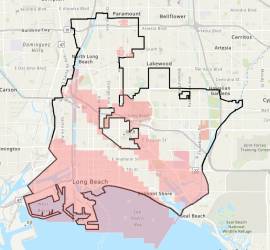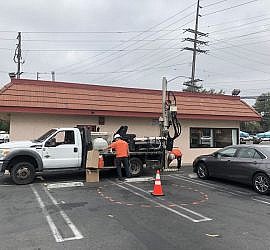Methane Deputy Inspector & City/County Inspection Services
A methane deputy inspector is a private environmental professional with special licensing and certification to provide vapor barrier installation inspection services. This performance is a requirement by local oversight agencies, such as the Los Angeles Department of Building and Safety (LADBS), or the Los Angeles County Department of Public Works (LACDPW). Each methane mitigation project with LADBS or Los Angeles County requires a methane deputy inspector to review mitigation plans and oversee the construction of all barriers and mitigation components. Moreover, inspectors must verify that proper construction methods are taking place, and that functionality tests pass in order to validate manufacturer warranties. Upon successful completion of each daily inspection, the deputy inspector prepares a daily report and certificate of compliance. Updated April 9, 2024.

Cost of Methane Deputy Inspection
Sometimes, agencies such as the LADBS have deputy-rate recommendations, that may loosely apply to deputy methane inspectors. However, a project’s location, duration, and scope of work can alter the cost of a methane barrier deputy inspection service. For instance, projects with multi-level subterranean garages in methane zones that intend to withstand hydrostatic groundwater pressure differ from slab-on-grade accessory dwelling units (ADUs). Current methane deputy inspection rates range from $115 to $150 per hour.
Los Angeles City Methane Zones & Methane Buffer Zones
Historical oil pumping fields and natural gas production wells are the main sources of methane gas hazards in shallow soil. Landfills, as well as the areas surrounding them, are another cause of methane soil gas. Awareness of the hazards of methane soil gas rises from explosions in central Los Angeles during the 1980s. Thus, the LADBS and other local agencies require methane testing and methane mitigation, as well as methane barrier deputy inspections, within these special methane zones and methane buffer zones.
Do I Need a Methane Deputy Inspector?
With most building departments, a methane deputy inspector is mandatory whereas methane mitigation systems are a requirement. This process aims to eliminate errors and protect the occupants of buildings from life-threatening explosions. Naturally, the oversight agencies want to make sure these systems are built correctly, so nobody gets hurt years later. Consequently, a methane mitigation inspector has the assignment to validate the integrity of it’s building, on behalf of the government agency. And this individual is nominally a trusted professional, with proven experience in the testing, design, and construction of mitigation systems.
Methane Testing
Methane testing is the process by which all deputy inspection services begin. To illustrate, a site with methane hazard zoning initially requires a methane test to develop a sense of the site-specific mitigation level. This task is overseen by a professional geologist and follows agency and industry standards. From there, a methane mitigation plan becomes necessary and uses the data resulting from the methane soil gas test. A methane deputy inspector is not required to oversee methane soil gas testing procedures.
Methane Mitigation Plan Design
Upon the completion of a methane test, geologists and engineers then design a mitigation plan. The basis of the plan covers the specific structural and architectural components of the development to be and implements passive and active systems to prevent methane gas from migrating indoors. Such plans can be complex, especially pertaining to multi-family and commercial developments with subterranean features, within high methane hazard zones. Ultimately, methane mitigation plans must get approval from the local building department before construction can commence. Although a deputy inspector does not actively prepare a mitigation plan, they must thoroughly review them, and validate compliance and approval by the lead oversight agency. And in the field, a methane deputy inspector has the responsibility of making sure the contractors build precisely in accordance with the final mitigation plan.
How to find a Methane Deputy Inspector
Each oversight agency manages a list of available methane deputy inspection professionals. For example, the City of Los Angeles administers a Public Roster of Deputy Inspectors, for all fields of work. And within this roster, are the list of available methane deputy inspectors, as well as other disciplines. There is a strict qualification process for such inspectors, as they are private professionals that the government agencies choose to legally rely on, in terms of quality assurance.


Rosters are in Alphabetical Order
Agency inspector lists are usually in alphabetical order. And there is no order or preference as to price, reliability, or quality of service. As a result, agencies do not advise solely contacting the individuals on the first page. Instead, the best results come about when thoroughly reviewing the document, and contacting multiple inspectors with names from the letters “A” to “Z.”
Geo Forward Methane Deputy Inspection
Geo Forward is a leading provider of Methane Deputy Inspection services for the City of Los Angeles, Department of Building and Safety (also referred to as LADBS). The methane deputy inspectors at Geo Forward have experience with the latest design standards and building code requirements for methane mitigation systems. Each inspector specializes in the installation of methane vapor barriers, for all types of building development projects. In fact, Geo Forward also offers comprehensive construction management and field support services during the deputy inspection process.





